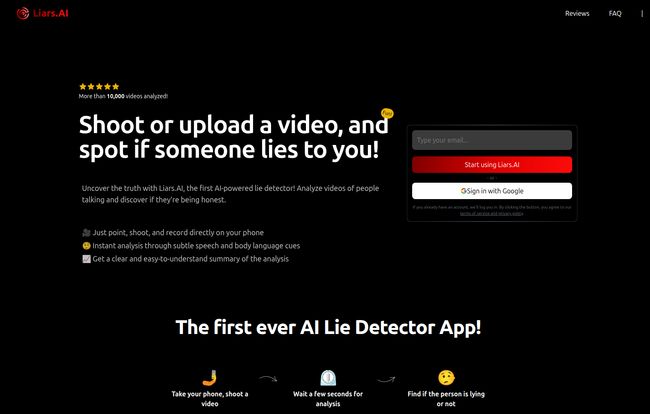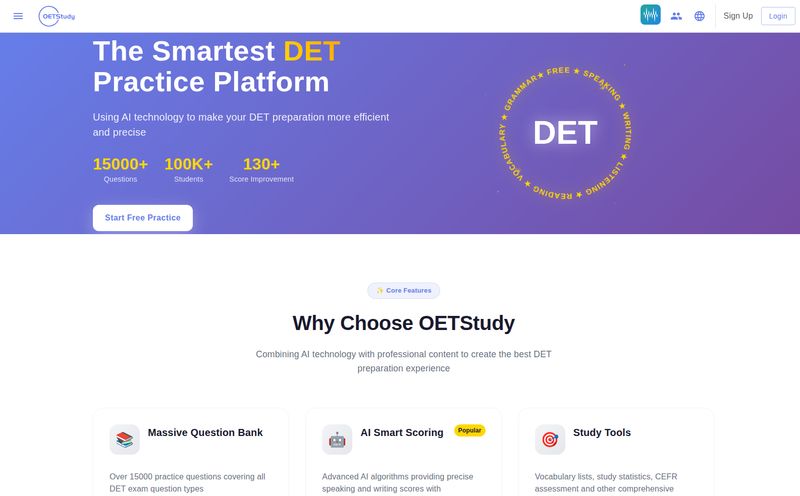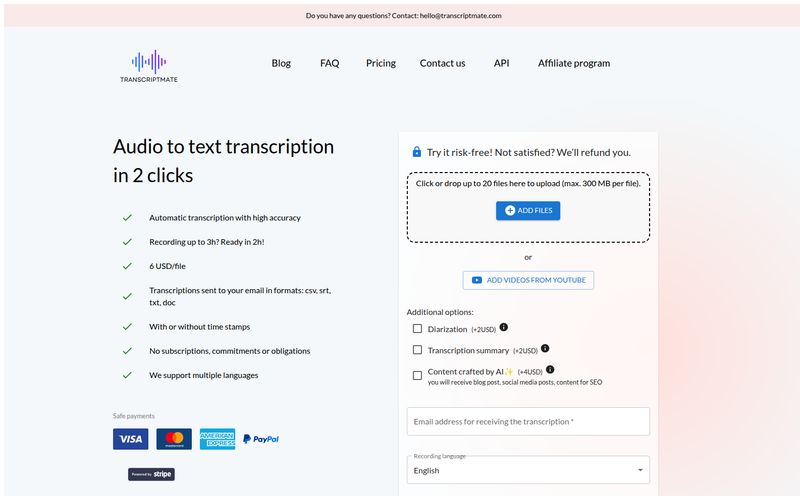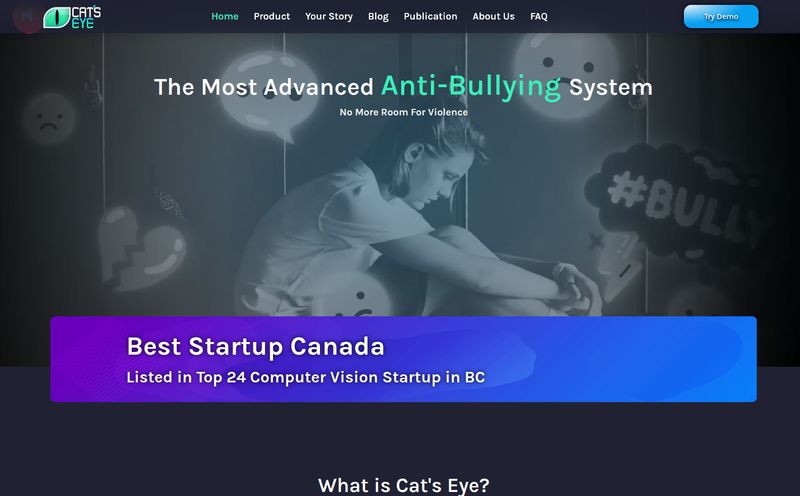We've all been there. That weird feeling in the pit of your stomach when a story just doesn't add up. Maybe it's a friend's flimsy excuse for bailing on plans, a partner's slightly-too-detailed alibi, or even a politician on TV whose smile doesn't quite reach their eyes. For years, we’ve relied on gut feelings and so-called “human intuition.” But what if tech could give us a nudge? A little digital tap on the shoulder saying, "Hey, you might want to look closer at this."
That's the promise of a tool I stumbled upon recently called Liars.AI. The name itself is, well, pretty on the nose, isn't it? It claims to be the first-ever AI lie detector app, capable of analyzing a video to spot if someone's being dishonest. My inner SEO-nerd and my perpetually curious human brain both lit up. An AI that reads people? It sounds like something straight out of a sci-fi movie. So, naturally, I had to see what was under the hood.
So, What Is Liars.AI, Really?
At its core, Liars.AI isn't some magic eight-ball. It’s an artificial intelligence platform designed to analyze the subtle, often unconscious, cues people give off when they speak. Think of it like a digital version of Dr. Cal Lightman from that old show Lie to Me. It's not listening to the words as much as it's watching how they're said.
The platform claims to analyze a whole host of non-verbal signals, including:
- Facial Expressions: We're talking micro-expressions, those split-second flashes of emotion that can betray our true feelings. A flicker of fear, a flash of contempt... stuff we'd normally miss.
- Body Language: Is the person fidgeting? Are their shoulders tense? Do they make unconscious blocking gestures? The AI is trained to pick up on these patterns.
- Tone of Voice: Beyond the words themselves, the pitch, cadence, and subtle wavers in someone's voice can be incredibly telling. The AI listens for these vocal biomarkers that signal stress or deception.
It then crunches all this data and spits out a report, complete with a verdict on whether it thinks the person in the video is being truthful. It's a bold claim, and one that carries a lot of weight.
How Does This Thing Actually Work?
The process itself is deceptively simple, which I have to admit is a big plus. There’s no complicated software to install or technical manual to decipher. It’s all web-based, meaning you can use it on your phone or your desktop computer.
The workflow is basically a three-step dance:
- Shoot or Upload a Video: You can either record a video directly through their platform or upload an existing one. This could be a recording of a conversation you had, a clip of a public figure from the news, you name it.
- Let the AI Do Its Thing: Once the video is uploaded, the AI gets to work. According to their site, this analysis only takes a few seconds. Behind the scenes, it's a whirlwind of data processing, with the AI scanning the video frame by frame for those tell-tale cues.
- Get Your Report: The final step is the big reveal. You receive a detailed analysis and a final determination: Lying or Not Lying.
It’s designed to be as straightforward as possible, removing any technical barriers so you can focus on the... well, the potential deception at hand.

Visit Liars.AI
The Good, The Bad, and The AI
No tool is perfect, especially one venturing into territory as complex as human psychology. After digging through their site and FAQs, I've got a pretty good sense of its strengths and where you need to be cautious.
What I Liked (The Upside)
The biggest pro is its accessibility. The idea of having a lie detector that doesn't involve strapping someone to a polygraph machine is undeniably appealing. Being able to just upload a video from your phone is a huge draw. I also appreciate that it provides a detailed report. It's not just a simple 'yes' or 'no.' It breaks down why it reached its conclusion, pointing to specific moments or patterns it detected. For those who love data, this is fantastic. Plus, they have an affiliate program, which is a smart move for generating traffic and building a user base. It shows they're confident enough in their product to incentivize word-of-mouth marketing.
Some Things to Keep in Mind (The Caveats)
Okay, now for the reality check. This is probably the most important part of this review. The creators of Liars.AI are very clear that the results should be seen as informative rather than definitive. This isn't a court of law. An AI's analysis is based on patterns and probabilities, not absolute certainty. Culture, nervousness, and a million other factors can influence body language. So, you can't take the report as gospel. It's a data point, not a final verdict.
A few other practical points stick out. There are no refunds. They state this is due to the high GPU processing costs involved in the analysis, which makes sense from a business perspective but is a tough pill for a user to swallow if they're not happy with the result. Also, and this is a big one, you are strictly prohibited from uploading videos of kids or minors. It’s a necessary ethical boundary. Finally, for my fellow tech folks, they don't accept PayPal or crypto for payments, it’s credit/debit cards only for now.
Let's Talk Money: The Cost of Uncovering the Truth
So how much does it cost to get this AI's opinion? The website doesn't list a clear pricing table on its homepage. The model seems to be a pay-per-analysis or subscription service, which you discover once you sign up. Given the mention of high GPU costs and the no-refund policy, it's clear this isn't a free tool. You're paying for a sophisticated, resource-intensive analysis. For anyone serious about using it, you'll need to go through the initial sign-up process to see the current pricing structure. Just be prepared to pay for the service upfront.
The Big Question: Should We Be Using This?
This is where things get a bit philosophical. Is it okay to use an AI to analyze a friend or partner? On one hand, the desire for honesty is a fundamental human need. On the other, using a tool like this could be seen as a breach of trust. My personal take? It’s all about intent.
If you're using Liars.AI to confirm a gut feeling before having a difficult but necessary conversation, it could be a useful tool. It might give you the confidence to address an issue you've been avoiding. But if you're using it as a weapon to win an argument or to snoop without any real basis for suspicion... that's a slippery slope. Like any powerful tool, it can be used for good or for ill. It's on us, the users, to approach it with wisdom and a healthy dose of skepticism about its findings.
Frequently Asked Questions
- Is Liars.AI accurate?
- The tool analyzes a wide range of data points, but the company stresses that its results are informative, not definitive. It should be used as one piece of information, not as absolute proof. Human behavior is complex, and many factors can influence body language and tone.
- Can I analyze videos of politicians or celebrities?
- Yes. The platform can analyze any video of a person speaking, provided it meets the quality guidelines. This makes it possible to analyze interviews, speeches, and public statements.
- Are my video uploads private and secure?
- According to their FAQ, they take data privacy seriously. You should always review the privacy policy of any service you upload personal media to, but they claim to keep your data secure.
- Can I try Liars.AI for free?
- The site doesn't mention a free trial. Access to the analysis is granted after payment, suggesting it is a paid-only service from the get-go.
- What if I'm not happy with the analysis? Can I get a refund?
- No. Liars.AI has a strict no-refund policy, citing the high computational costs required to process each video. This is an important factor to consider before making a payment.
My Final Thoughts on Liars.AI
Liars.AI is a fascinating, slightly unnerving piece of technology. It represents a new frontier in how we use AI to interpret the world around us. It’s not a magic truth serum, and it would be dangerous to treat it as such. However, as a tool for generating insights and prompting deeper questions, it has some serious potential.
For me, it's a powerful reminder to pay closer attention—to the words people say, and more importantly, to everything they don't. Whether you use an AI for it or just your own two eyes, the truth is often hiding in plain sight. You just have to know where to look.



